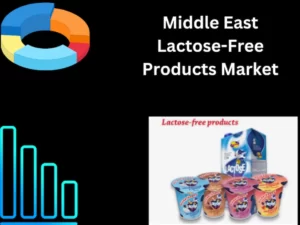
- Published 2024
- No of Pages: 200
- 20% Customization available
Middle East Lactose-Free Products Market Research Report, Analysis and Forecast
Middle East Lactose-Free Products Market Synopsis
The popularity of lactose-free products is growing in the Middle East due to various reasons. One of the primary reasons is that lactose intolerance is prevalent among a significant portion of the population in the region. Lactose intolerance is the inability to digest lactose, a sugar found in milk and dairy products, which can cause digestive discomfort and other symptoms such as bloating, gas, and diarrhoea.

Furthermore, there is a growing demand for alternative dairy products due to health concerns and dietary preferences. Many people are looking for dairy alternatives to reduce their intake of saturated fats and cholesterol, which are commonly found in dairy products. Additionally, there is a trend towards veganism and plant-based diets, which exclude animal products, including dairy.
Lactose-free products include a wide range of items such as milk, yoghurt, cheese, and ice cream. These products are made by removing or breaking down the lactose sugar found in dairy. Additionally, there are also lactose-free alternatives to dairy products, such as plant-based milk, yoghurt, and cheese made from soy, almond, coconut, and other non-dairy sources.
The lactose-free market in the Middle East is mainly dominated by supermarkets and hypermarkets. These stores offer a wide range of lactose-free products, catering to the diverse dietary needs and preferences of consumers. Additionally, convenience stores also offer some lactose-free options, mainly in the form of snacks and drinks.
The United Arab Emirates is the leading market for lactose-free products in the region, followed by Saudi Arabia and Qatar.
Dairy-based lactose-free products account for the largest share of the regional market, with a share of more than 50%.
Growing awareness about lactose intolerance among consumers is the major driver of the regional market.
The growth of the e-commerce sector has also contributed to the growth of the regional market.
In conclusion, the popularity of lactose-free products in the Middle East is primarily driven by the prevalence of lactose intolerance and the growing demand for alternative dairy products due to health and dietary concerns. The lactose-free market includes a wide range of products, including dairy alternatives, and is mainly dominated by supermarkets and hypermarkets.
Middle East Lactose-Free Products Market: Overview
Lactose-free products are food items that are made without lactose, a type of sugar commonly found in milk and milk-based products. These products are designed to cater to individuals who are lactose intolerant or have difficulty digesting lactose.
Lactose-free products come in various forms, including milk, cheese, yoghurt, and other dairy products. These products are made by breaking down lactose into simpler forms of sugar through the use of lactase enzymes. This process converts lactose into glucose and galactose, which can be easily digested by individuals who are lactose intolerant.
Lactose-free milk is one of the most popular lactose-free products on the market. It is made by adding lactase enzymes to regular milk, which breaks down the lactose into simpler forms of sugar. Lactose-free milk is available in liquid, powder, and other forms.
Cheese and yoghurt are other lactose-containing dairy products that are commonly made in lactose-free versions. These products are made by adding lactase enzymes during the production process, which breaks down the lactose and makes them more easily digestible for individuals who are lactose intolerant.
Lactose-free products can come in solid, liquid, or powder form. Lactose-free milk is commonly found in liquid form, while lactose-free cheese and yoghurt are often found in solid form. Lactose-free powder products, such as powdered milk or protein powder, are also available.
Lactose-free products can be found in supermarkets, hypermarkets, and convenience stores. The popularity of lactose-free products is growing in the Middle East as more people are becoming aware of lactose intolerance and seeking out alternatives to traditional dairy products.
Saudi Arabia Lactose-Free Products Market Synopsis
The Lactose-Free Products market in Saudi Arabia is growing due to the increasing awareness about the benefits of lactose-free products and the rising health consciousness among the population. As more and more people become aware of the health benefits of lactose-free products, they are more likely to purchase these products which have led to a surge in the demand for lactose-free products in Saudi Arabia. This has also been supported by the government’s efforts to promote a healthy lifestyle among its citizens. Furthermore, the presence of a large number of lactose-intolerant people in the country has also been a major factor driving the growth of the lactose-free products market in Saudi Arabia.
UAE Lactose-Free Products Market Synopsis
The Lactose-Free Products market in the UAE is growing due to the increasing number of health-conscious consumers in the country. As more and more people become aware of the health benefits of lactose-free products, they are more likely to purchase these products, leading to an increase in the demand for lactose-free products in the UAE. In addition, the availability of lactose-free products in supermarkets, hypermarkets, and online stores has also been a major factor driving the growth of the lactose-free products market in the UAE. Furthermore, the presence of a large number of lactose-intolerant people in the country has also been a major factor driving the growth of the lactose-free products market in the UAE.
Middle East Lactose-Free Products Market: Segmentation
The middle east Baby Care Products market has been segmented By Type and By Form.
Based on the By Type, the middle east has Milk, Cheese, Yogurt, and Others. In 2021, the milk segment held a significant share. This was mainly due to increased demand due to the pandemic. Furthermore, rising health awareness among consumers and innovative products launched drove market growth. Additionally, lactose-free milk availability boosted the market growth. Consumers started to pay more attention to their health and nutrition during the pandemic, which made them switch to dairy products like milk. Companies launched innovative products such as flavoured milk, lactose-free milk, and enhanced milk to cater to the changing preferences of consumers. This further drove the growth of the segment.
Based on Form, the market is classified as lactose-free products for Solid, Liquid, and Powder. In 2021, the segment is expected to account for a significant share of liquids. This is due to the increasing demand for liquid products in the food, beverage, and pharmaceutical industries. Ready-to-drink beverages and convenience foods drive segment growth. Moreover, increasing consumer awareness about liquid products’ health benefits is contributing to the segment’s growth. Moreover, the increasing number of health-conscious consumers, coupled with the growing emphasis on leading a healthy lifestyle, is driving the segment’s growth even further.
In 2021, the Middle East Lactose-Free Products space saw several significant developments.
- In April 2021, GoodMoo, a UAE-based dairy alternative manufacturer, announced the launch of its first lactose-free product – GoodMoo Lactose-Free Milk.
- In May 2021, Israeli dairy-free product company, Tivall, announced the launch of its first lactose-free product – Tivall Lactose-Free Milk.
- In June 2021, Lebanese dairy-free product company, Al-Rawabi, announced the launch of its first lactose-free product – Al-Rawabi Lactose-Free Milk.
- In July 2021, Kuwaiti dairy-free product company, Almarai, announced the merger with a rival company, Al-Safat Dairy, which produces a range of lactose-free products.
- In August 2021, Saudi Arabian dairy-free product company, Almarai, announced the launch of its first lactose-free product – Almarai Lactose-Free Milk.
In 2022, there were several acquisitions in the Middle East Lactose-Free Products company space.
- In April 2022, the UAE-based dairy company Al Rawabi announced that it had acquired the Saudi Arabian lactose-free company Milkuat. This acquisition was part of Al Rawabi’s strategy to expand its presence in the Middle East and beyond, and to further develop its range of lactose-free products. The acquisition has enabled Al Rawabi to expand its offering of lactose-free products, helping to meet the needs of customers who are unable to consume lactose.
- In June 2022, the Kuwaiti dairy company Kuwait Dairy Company (KDC) announced that it had acquired the Dubai-based lactose-free products company Natural Dairy Solutions (NDS). KDC has been able to use the acquisition to expand its product range and better meet the needs of customers with lactose intolerance or other dietary restrictions. As a result, customers have been able to access a wide range of lactose-free products from their local KDC stores.
- In November 2022, the Qatar-based dairy company Qatar Dairy announced that it had acquired the Bahrain-based lactose-free products company Lacto-Life. This acquisition has enabled Qatar Dairy to extend its range of lactose-free products and to better meet the needs of customers that require dairy products that are free of lactose. The acquisition has also helped Qatar Dairy to increase its presence in the Middle East dairy market.
The Middle East Lactose-Free Products Market is segmented as follows:
By Type
- Milk
- Cheese
- Yoghurt
- Others
By Form
- Solid
- Liquid
- Powder
By Region
- The Middle East
- Saudi Arabia
- UAE
- Qatar
- Kuwait
- Oman
- Rest of the Middle East
“Every Organization is different and so are their requirements”- Datavagyanik
Companies We Work With






Do You Want To Boost Your Business?
drop us a line and keep in touch

